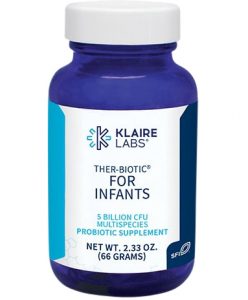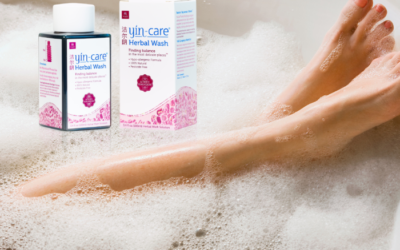The Benefits of Ther-Biotic For Infants
 Ther-Biotic for Infants supports the infant microbiota that can be easily disrupted by C-section delivery, hospitalization, maternal diet, antibiotic use, environmental exposures, medications, and formula feedings.
Ther-Biotic for Infants supports the infant microbiota that can be easily disrupted by C-section delivery, hospitalization, maternal diet, antibiotic use, environmental exposures, medications, and formula feedings.
The benefits related to Ther-Biotic for Infants:
- Protects the infant’s gastrointestinal & immune system – It supports the maturation of these systems in an infant’s body.
- Fosters microbial balance – Its carefully selected probiotic strains can change the gut microbiota and make it more favorable for the infant. Simultaneously, it helps stimulate the baby’s healthy immune response while fighting compounds that threaten the gut microbiome diversity, such as bacteriocins.
- Supports a healthy immune response – The formula supplies 5 Lactobacillus species which are crucial for the differentiation of an infant’s dendritic cells and the development of his/her immune system. As a result, innate immunity is enhanced, and the immune response is fully supported.
- Allows the infant GI tract to metabolize the D(-) isomer of lactic acid – This acid is produced by certain Lactobacillus species in adult probiotics. Ther-Biotic for Infants contains these strains of Lactobacillus that produce a safe-for-the-infant’s-metabolism L(+) isomer of lactic acid.
How to Use Ther-Biotic for Infants
 The manufacturer, Klaire Labs, recommends the formula is taken by children over 12 months. In this case, one scoop once or twice a day will do. However, the product can also be given to infants between 6-12 months (consult your pediatrician before using the formula), who can take one scoop once a day.
The manufacturer, Klaire Labs, recommends the formula is taken by children over 12 months. In this case, one scoop once or twice a day will do. However, the product can also be given to infants between 6-12 months (consult your pediatrician before using the formula), who can take one scoop once a day.
Unless otherwise instructed by your healthcare professional, you may mix the formula into beverages or foods. If breastfeeding, you can place a small amount of Ther-Biotic for Infants on your finger or nipple. Alternatively, you may add the powder to expressed milk.
Important notes about Ther-Biotic for Infants
- The formula does not contain any common allergens. So, it is free of soybeans, gluten, wheat, peanuts, tree nuts, shellfish, eggs, fish, casein, and milk.
- Ther-Biotic for Infants should NOT be fed directly to the child or infant.
- Speak with your physician if your child or infant is under 6 months old before giving them the formula.
- Consult your doctor if your offspring are taking prescription drugs or have a medical condition before using the product.
- The formula is clean for optimal results and available in powder (5B CFU) that can be mixed with food, formula, or breast milk.
- Each scoop is 0.5 grams and provides 5 billion Colony Forming Units (CFU).
Why a Healthy Gut Microbiome Is So Important
The human body is a miraculous machine composed of many different parts that work together and perform key functions daily. The better care we take of our body, the better it is able to give us good and lasting health. But, that’s more or less no news for most of us.
What most people are not aware of, though, is the fact that the body has trillions of fungi, viruses, and bacteria, collectively known as the microbiome. Roughly put, the human body has around 30 trillion human cells and 40 trillion bacterial cells. And, although some of them are related to disease, others are very important for the healthy function of the heart, the immune, and many other health aspects.
The overwhelming majority of these bacteria and fungi live in the gut. So, don’t be surprised to hear that without the gut microbiome, it would be almost impossible to survive. Studies have also found that the gut microbiome may also control brain function by affecting the central nervous system.
So, besides helping us fortify our immune and cardiovascular systems (among others), a balanced gut microbiome may also encourage healthy brain function. Therefore, it becomes apparent that ensuring a healthy gut microbiome from an early age (meaning, infancy) is critical to one’s overall wellbeing and health. You are about to find out why, how, and what you can do to support the normal microbiota of your infant or child.
Gut Microbiome Deficiency in Infants
Unfortunately, a recent peer-reviewed study has shown that the vast majority of infants in the USA could be suffering from gut microbiome deficiency. According to it, most infants are lacking a significant bacterium that is highly required for the digestion of breast milk and the development of their immune system. The same bacterium also helps protect against gut pathogens that are associated with diaper rash, colic, and other conditions common among newborn babies. That specific type of gut bacteria is called Bifidobacterium longum infantis (aka B. infantis) and is (or should be) part of the infant’s gut microbiome.
The important role of B. infantis bacteria
Without B. infantis bacteria (or having an insufficient number of it in the gut microbiome), the infant‘ s gut health is compromised as his/her body is unable to unlock the full range of nutritional benefits of breast milk. This is because these particular bacteria help break down the carbohydrates in breast milk into usable nutrients, which the infant cannot access otherwise. Even more importantly, though, the presence of B. infantis fosters the protection of the infant’s intestinal tract from potentially harmful bacteria, such as E.coli (Escherichia coli), Salmonella, Staphylococcus, Streptococcus, and Klebsiella pneumoniae, while encouraging the development of the infant’s immune system.
Although it appears that infants are found deficient in this crucial bacterium from their early weeks of life, you should not take any blame for not having figured it out. Truth be told, most pediatricians and parents do not realize their infant has an elevated need to restore their gut health.
Infant gut microbiome and antibiotic resistance
The infant’s gut is like a blank slate the moment he/she is born and quickly gets his/her bacteria from both his/her mother and the environment. According to the same study, infants in the USA show remarkably high levels of pathogenic bacteria and an extensive lack of good bacteria. At the same time, they are born in an environment where antibiotic resistance is becoming more and more widespread. This is believed to be a critical factor that could underpin many of the ailments seen today across the country in infants and children alike.
The Impact of Gut Bacteria on a Newborn’s Health
The gut of an infant requires thousands of different bacteria so that it can perform its biological processes, the development of the systems and biological structures, and other functions. When the beneficial bacteria in their gut are outnumbered by potentially pathogenic (harmful) ones, gut dysbiosis occurs (imbalanced gut health). Why this happens is still debatable. Many scientists claim, though, that the increased use of infant formula, the increased use of antibiotics, and the increased C-section delivery could contribute to this. As a result, the infant’s gut is at a much greater risk for compromised immune system development and other negative consequences.
How is the newborn exposed to microbes that affect the gut microbiome?
What we already know is that when the baby passes through his/her mother’s birth canal, he/she is exposed to microbes. However, new research shows that some microbes inside the womb may also affect the baby even before its birth. As the baby grows, their gut microbiome starts to diversify and be colonized by different types of microbial species. In general, the higher the diversity of the gut microbiome, the better it is for their health. Among the factors that affect this diversity is the food the infant eats, including breast milk. In fact, the baby gets its first bacteria growing (Bifidobacteria) by digesting the healthy sugars in breast milk.
Illnesses Linked to Changes in the Infant’s Microbiome
It has been evidenced that there is an association between the development of chronic illnesses, such as inflammatory bowel syndrome (IBS), diabetes, allergic diseases, and asthma, and changes to the microbiome during infancy. Besides everything else mentioned above, the microbiome can also change the metabolism of medications, affect the body’s responses to vaccines, and protect the body against certain pathogens.
The Importance of Nutrition In a Developing Infant
It is becoming more apparent with each passing day that proper nutrition plays a vital role in the developing child. An increasing number of scientists is now focused on understanding the complex interactions between a child’s nutritional status and their microbiome. Undernutrition has physical effects on children under five years old while also making them more prone to infections. It also impacts their neurodevelopment. According to evidence, the pathogenesis of malnutrition and microbes are closely related because microbiomes are immature in malnourished children, which also decreases the much-needed microbial diversity.
Obviously, the gut microbiome is one of the most significant factors affecting an adult’s life, let alone an infant. And, since an infant’s health is built from the moment he/she is born, it is paramount to ensure that their gut microbiota is healthy so they can enjoy healthy adolescence and adulthood later on. Ther-Biotic for Infants can contribute to an infant’s health and well-being.



